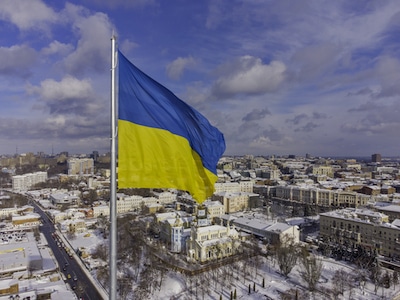Recent months have seen a lengthy debate over Ankara’s objection to Sweden and Finland’s membership in the North Atlantic Treaty Organization (NATO), according to Vox. Unfortunately, there is no clear end in sight.
Sweden and Finland have not attempted to previously join NATO because they were apprehensive about how their close neighbor, Russia, would react. During the Cold War, for instance, Sweden and Finland wanted to make sure not to antagonize a Russia that would not take kindly to a NATO presence – or NATO missiles – on its western border.
But since Russia’s deliberate invasion of Ukraine in 2022, the situation became different. Vladimir Putin’s decision to start a war in Ukraine made it clear that Moscow is not playing by the rules anymore. As a result, Poland, Sweden, Finland, and the Baltic states have rethought their homeland security stance in regard to Russia and NATO.
Related: Poland Improves Its Position as a Powerful Nation
Why Is Turkey Able to Oppose Sweden and Finland’s NATO Membership?
So why can Turkey oppose Sweden and Finland’s NATO membership? To join NATO, all of its member states need to approve new members, including Turkey.
Turkey says that there are terrorist activities against Turkey that have originated from Sweden. There is a large Kurdish immigrant community in Sweden that is vocally critical of Turkey.
This community supports the Kurdistan Workers’ Party (also known as the PKK), a Kurdish organization that has used violence against Turkish targets for several decades. This organization is attempting to gain independence for the large Kurdish minority in Turkey that numbers into the millions.
According to the Department of Defense, NATO Secretary General Jens Stoltenberg reported that last summer Sweden and Finland had moved closer to NATO membership. Stoltenberg said, “I commend all allies for moving so quickly in accepting Finland and Sweden’s applications for membership, and I want to thank Turkey, Finland and Sweden for their constructive approach… The trilateral agreement they signed at the Madrid summit made today possible.”
But Stoltenberg’s optimism was premature. As Reuters noted, the implementation of Sweden and Finland’s NATO membership has met difficulties. According to Reuters, “Turkey wants Stockholm and Helsinki to take a tougher line against the PKK and another group it blames for a 2016 coup attempt. In Madrid, Finland and Sweden agreed to work harder to fight terrorism, including intensifying work on the extradition and deportation of suspected militants.
“But Sweden’s courts have blocked some expulsions. Tensions between Sweden and Turkey have also been heightened by protests in Stockholm which Ankara says are hate crimes but are covered by Swedish free-speech laws.”
The Qur’an Burning in Stockholm
Tensions between Turkey and Sweden have been running high for a while. This situation was not helped when far-right Danish-Swedish politician and provocateur Rasmus Paludan burned the Qur’an, the holy text of Islam, near the Turkish embassy in Stockholm in late January, according to The Guardian.
Turkey is a Muslim country, so the burning of the Qur’an was considered highly offensive. In addition, it sent shock waves through the Muslim world, and there were threats against Western embassies in Turkey, according to Voice of America.
The Guardian also suggested that a far-right Russian journalist was connected to Paludan’s provocative act. According to The Guardian, “Swedish media have reported that Paludan’s demonstration permit of 320 Swedish krona (£25, $31) was paid for by a former contributor to the Kremlin-backed channel RT, Chang Frick, who now does regular media spots for the far-right Sweden Democrats. Frick has confirmed he paid for the permit to hold the protest but denied he had asked anyone to burn the Muslim holy book.”
What Will Happen Next with Sweden and Finland’s NATO Membership?
For NATO, it is important to add the Scandinavian countries, because it will solidify a line that will block future Russian expansionist tendencies, which has happened in Ukraine and Georgia. Putin has made it clear in multiple speeches and articles alongside his ideological mentor, Alexander Dugin, that he is seeking a Russian empire. A strong NATO presence in Scandinavia, the Baltic states, Hungary and Poland limits the Russian sphere of influence.

How can the NATO membership of Sweden and Finland move forward against Turkish opposition? The U.S. has an interest in expanding NATO and has several options to bring Turkey back to the table to approve the two new members.
As I noted a few months ago, Turkish President Erdoğan has recently been less inflammatory for some reason. Erdoğan wants military technology and F-16s from the U.S., according to Reuters. More importantly, Global Conflict Tracker says that Erdoğan wants clarification about the continued cooperation between the U.S. and Kurdish forces fighting ISIS in northern Syria.
It appears likely that Erdoğan will eventually allow Sweden and Finland to join NATO if he is to get the military technology and jets that he wants. Clearly, Erdoğan has geopolitical goals to pursue.
Also, he will most likely use this concession to NATO membership to achieve something positive before the upcoming elections in Turkey, since Turkey’s current recession is making him less attractive to voters. But with the current domestic crisis caused by the earthquakes in Turkey, Erdoğan’s schedule will be full in the near future.

Comments are closed.